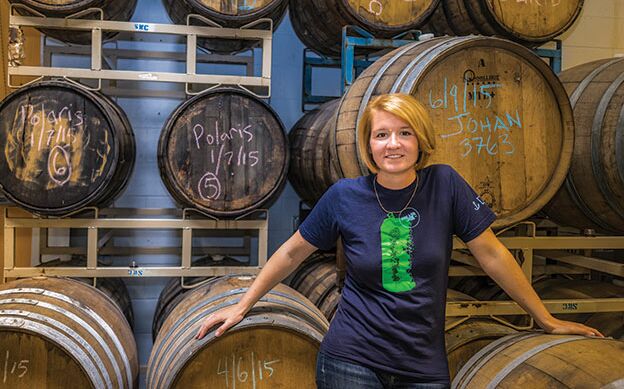New law gives small Maine craft breweries, distilleries a boost
 FILE PHOTO / WILLIAM TREVASKIS
Heather Sanborn, co-owner of Rising Tide Brewing Co., spoke in favor of a bill, signed by Gov. Janet Mills, that makes it easier for small Maine craft breweries and distilleries to do business.
FILE PHOTO / WILLIAM TREVASKIS
Heather Sanborn, co-owner of Rising Tide Brewing Co., spoke in favor of a bill, signed by Gov. Janet Mills, that makes it easier for small Maine craft breweries and distilleries to do business.
A bill that makes it easier for the state's smaller craft brewers and distilleries to operate, by loosening regulations and expanding the definition of a small brewery, was signed by Gov. Janet Mills.
LD 1761 was one of 606 bills Mills signed this Legislative session, and among the final ones inked in July. A few dozen more were put on hold for further review.
The new craft brewery and distillery law changes the definition of a small craft brewer from a company with annual production of 50,000 gallons, or about 1,600 barrels, to 30,000 barrels a year. The bill also redefines how contracts with wholesalers and retail businesses work, making it easier for small operations to be flexible in their distribution.
The bill was proposed by a group that included Kai Adams, co-founder of Sebago Brewing in Gorham and president of the Maine Brewers' Guild. Adams told the Veterans and Legal Affairs Committee in May that there was a "very strong message from our members that they need to broaden their self-distribution further to support their growth, and reform Maine's franchise laws."
State Sen. Heather Sanborn, who represents the Portland-Westbrook area and is also co-owner of Rising Tide Brewing Co. in Portland, said her district is home to nine breweries.
She told the committee the bill modernizes outdated law, written in 1979, "which evolved in a very different era when our distributors were small and local (and they mostly still are) and our beer suppliers were big and faceless and out of state (which they now decidedly are not)."
"Under the current law, small breweries that reach a very low production threshold of 50,000 gallons — a point at which a brewery can likely only employ a handful of people — have to enter into a distribution arrangement with a distributor," she said. Under that law, it's difficult to get out of that relationship. She said the bill didn't stem from bad relationships with distributors, and most of those relationships are good.
"We simply think that the time has come to update Maine's law to reflect the current economic realities of the beer marketplace in Maine, level the playing field a bit between our local distributors and our local breweries, and set the stage for continued growth of our industry," she said.
Jamie Blood, owner and head brewer at Corner Point Brewing, in Berwick, is the type of brewer the law is meant to help. He told the committee his brewery, which was founded in 2017 and opened in 2018, employs himself and two others. He plans to brew 600 barrels this year, but the law will keep him from having to "completely overhaul" his business plan when he gets to 1,600 barrels, he said.
"It will give us the opportunity to sell more beer in more locations, which will promote growth," he said, and also allow the business to grow naturally.
State Sen. Louis Luchini, who represents Hancock County's District 7, sponsored the bill. "As you know, this industry has an enormous economic impact on Maine — creating thousands of jobs, drawing tourists to Maine, and keeping young people in our state," he told the committee.
A report by the Univeristy of Southern Maine, and issued by the Maine Brewers Guild in January, found Maine craft brewers directly employ 1,910 people across the state and pay more than $54 million in wages. The report found that breweries 87% of the industry is made up of small breweries producing fewer than 50,001 gallons a year.
'Positive direction'
“I have signed more than six hundred bills into law this Legislative session. These new laws — sponsored and supported by Democrats, Republicans, Independents and Greens alike — will move Maine in a positive direction,” said Mills in the release.
“From expanding access to health care, embracing renewable energy, improving our education system, diversifying our economy, and much more, I am proud of the progress we have made, and I look forward to continued collaboration on behalf of the people of Maine.”
Besides signing 606 bills, Mills has allowed 45 to become law without her signature and has vetoed eight, all of which were sustained by the Legislature.
Mills has three days to act on bills that were held once the next session starts.
“The Legislature has passed a significant number of bills this session, and I take seriously my constitutional obligation to thoroughly review all of them, evaluate their implications, and decide whether they are in the best interest of Maine people," she said in the release. "In order to meet that responsibility, I will continue to review these bills and gather more information, and I look forward to acting on them at the beginning of the next legislative session.”
For information on all the 129th Legislature's bills, visit the Maine State Legislature bill information webpage. The final group of bills signed by Mills include:
LD 459 "An Act To Include Homelessness in the Laws Governing Emergency General Assistance"
LD 847 "An Act To Ensure Persons with Disabilities Have Access to Public Rest Rooms"
LD 855 "An Act To Strengthen the Maine Uniform Building and Energy Code"
LD 898 "An Act To Provide for a Professional Wage and Support for New Educators"
LD 959 "An Act To Increase Funding for the Maine Lakes Society "LakeSmart" Program and the Lake Stewards of Maine Volunteer Lake Monitoring Program"
LD 1028 "An Act To Prevent and Reduce Tobacco Use with Adequate Funding and by Raising the Tax on Tobacco Products"
LD 1094 "An Act To Increase Funding for Staffing for the Child Welfare Services Ombudsman Program"
LD 1149 "An Act To Strengthen Resource Sharing and Access to Library Materials among Maine Libraries"
LD 1274 "An Act To Enact the Health Insurance Consumer Assistance Program"
LD 1277 "An Act To Require the Director of the Maine Center for Disease Control and Prevention To Be Credentialed"LD 1671 "An Act To Amend the Laws Governing the Maine Capital Investment Credit To Ensure Fairness for Maine Businesses"
LD 1337 "An Act To Save Lives by Establishing a Homeless Opioid Users Service Engagement Program within the Department of Health and Human Services"
LD 1523 "An Act To Ensure the Quality of and Increase Access to Recovery Residences"
LD 1548 "Resolve, To Promote Quality and Transparency in the Provision of Services by Assisted Housing Programs That Provide Memory Care"
LD 1573 "An Act To Clarify Provisions of the Maine Juvenile Code Regarding Inspection, Disclosure and Dissemination of Juvenile Case Records and To Change Gender-specific Terms"
LD 1628 "An Act To Implement Recommendations of the Department of Environmental Protection Regarding the State's Container Redemption Laws"
LD 1749 "An Act To Amend the State's Hemp Laws"
LD 1761 "An Act To Assist Small Beer Manufacturers"
LD 1844 "Resolve, Directing the Public Utilities Commission To Evaluate the Ownership of Maine's Power Delivery Systems" (Emergency).














0 Comments